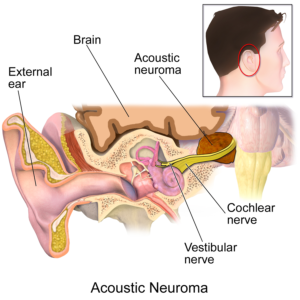
Tinnitus is a common symptom of an acoustic neuroma. So is hearing loss.
And in fact, when both tinnitus and hearing loss occur in only one ear, this is highly suspicious for an acoustic neuroma.
An acoustic neuroma is an overgrowth of Schwann cells in the middle ear. Sometimes this benign and slow growing tumor is called a vestibular Schwannoma.
It is not cancer and will never metastasize. If left untreated, the tumor can grow large enough to press on the brainstem and become life threatening.
However, symptoms of an acoustic neuroma pretty much guarantee that this non-cancerous mass will never reach a life threatening point of growth.
After all, it’s not likely that a person will refuse to see a doctor when they’ve begun experiencing hearing loss, especially if it’s sudden – and especially if it’s accompanied by tinnitus and/or other symptoms of an acoustic neuroma such as dizziness, unsteadiness and facial numbness.
The tinnitus of an acoustic neuroma may be the first, and only, symptom.
Hearing loss may also be the only symptom, and it may be gradual in onset or sudden (acute).
And there are patients for whom tinnitus and hearing loss have had a simultaneous onset.
How Soon After Tinnitus Is Hearing Loss from Acoustic Neuroma?

Source: Blausen.com staff
But sometimes one symptom follows the other. So I asked Dr. Hamid R. Djalilian, MD, how soon after the onset of tinnitus might hearing loss occur, when the latter symptom follows the former symptom.
“Tinnitus and hearing loss generally occur together,” says Dr. Djalilian, Director of Neurotology and Skull Base Surgery, University of California, Irvine, School of Medicine.
“Sometimes the tinnitus may be noticed sooner than the hearing loss because it is a new sensation. If the hearing loss is sudden, it is noticed earlier.
“However, if hearing loss is gradual it may not be noticed until it is more advanced.”
Though the duo of tinnitus and hearing loss have a multitude of possible causes, what makes this duo point to acoustic neuroma is the eventual addition of more symptoms (e.g., the dizziness, unsteadiness and facial numbness).
Other symptoms might be a headache, difficulty swallowing, a hoarse voice, changes in taste sensation and confusion.
If the tinnitus and hearing loss are occurring in only one ear, and there’s also headaches only on that side, this really makes things highly suspect for an acoustic neuroma.
But only an MRI can make the diagnosis, based on the location of these slow growths – which in some cases don’t even produce any symptoms and are discovered by accident during an MRI for an unrelated situation.
One in 100,000 Americans are diagnosed with an acoustic neuroma every year, and less than two percent of cases of unilateral tinnitus with hearing loss turn out to be one of these benign masses.
 Dr. Djalilian’s areas of expertise include complex ear surgery, hearing loss, tinnitus, balance disorders, facial nerve paralysis and skull base surgery. He conducts research in several areas related to cochlear implants and acoustic neuroma.
Dr. Djalilian’s areas of expertise include complex ear surgery, hearing loss, tinnitus, balance disorders, facial nerve paralysis and skull base surgery. He conducts research in several areas related to cochlear implants and acoustic neuroma.
 Lorra Garrick has been covering medical, fitness and cybersecurity topics for many years, having written thousands of articles for print magazines and websites, including as a ghostwriter. She’s also a former ACE-certified personal trainer.
Lorra Garrick has been covering medical, fitness and cybersecurity topics for many years, having written thousands of articles for print magazines and websites, including as a ghostwriter. She’s also a former ACE-certified personal trainer.
.









































